A Different Look on Law: Why Punish People for “Speeding”?
by Eric Peters
 Why should anyone be subject to punishment merely for driving “x” speed? Is it not of a piece with punishing someone for merely consuming alcohol?
Why should anyone be subject to punishment merely for driving “x” speed? Is it not of a piece with punishing someone for merely consuming alcohol?
The justification usually given is that “speeding” might cause harm.
Ok, sure. The same is true about drinking beer. Someone (generally) might drink beer and beat his wife. But we do not presume (for now) that everyone who drinks beer willbeat his wife – and thus, drinking beer must be forbidden. And violators of this policy punished.
What about punishing (hold onto that thought) people when – and only if – they actually do cause harm? Not before – and not because they might. Or because “someone” else has.
It’s a crazy idea, I realize.
Imagine: You’d only have to sweat cops or face a judge if you (and not some other person you never even met) could plausibly be charged with having caused harm to an actual victim or damaged the actual property of someone else. Mark that. A flesh and blood victim would have to be presented.
And it would be the obligation of the courts to prove that harm was done to establish guilt before requiring restitution (much preferable to punishing people, which smacks of house training a puppy).
There would be an end to this business of people being put through the system who’ve harmed no one. Who are punished for manufactured offenses against the state.
Can the state be a victim?
Is the Tooth Fairy real?
It’s absurd – and vicious.
Do you feel guilty of wrongdoing when pulled over by a cop for not wearing a seatbelt? Who have you harmed? What justification – other than “it’s the law” – is there for punishing you?
How about driving faster than an arbitrary number plastered on a sign? You get pulled out from a crowd of others doing the same thing; none of you harming anyone or even plausibly threatening it. It’s merely your unlucky day. Your time to pay.
As the cop slides in behind you, does your internal monologue run along the lines of, “well, yeah… I did a bad thing… I deserve this.”
Or do you feel disgust, anger – and resentment?
Of course.

This has serious implications.
Laws without a moral basis are just arbitrary rules. They have no moral force – and that makes people subjected to them feel abused. Which they have been. Meanwhile, it also makes it more difficult to deal with the relatively small number of people in society who actually do cause harm to others. If you doubt this, take a drive into a “bad” neighborhood; where are all the cops?
They’re manning radar traps and safety checkpoints in the “nice” neighborhoods!
Remember the “Drive 55″ idiocy that lasted from about 1974 to 1995? Overnight – and for the next 20 years – it became illegal “speeding” to drive 70 when the day before it had been legal to do that and – presumably (being legal) “safe.” How does it become “unsafe” to drive 70 on the same road today that it was (apparently) “safe” to drive 70 on yesterday?
What was it Bob Dooole used to say? You know it, I know it, the American people know it.
Millions of people were simply ripped off – had their money stolen from them under color of law.
The contempt and corruption this bred is incalculable. It festers to this day. Because while “Drive 55″ is history, the same rigmarole exists on secondary roads. Every day, thousands of people are pulled over and literally robbed. Issued what amount to ransom notes – state-sanctioned extortion – for driving at reasonable and prudent velocities that happen to have been codified as illegal “speeding.” The fact that virtually every one “speeds” – this includes cops – is the clearest, most inarguable proof that the laws are absurd. And their enforcement a sort of low-rent sadism that also happens to be very profitable.
What’s the solution?
 Speed limits as such ought to be thrown in the woods. They are arbitrary, morally indefensible – and most of all, one-size-fits-all.
Speed limits as such ought to be thrown in the woods. They are arbitrary, morally indefensible – and most of all, one-size-fits-all.
People are individuals and some people are better at certain things than others. This includes driving. Tony Stewart is a better driver than I am. But I am a much better driver than my mother-in-law. Why should Tony Stewart be dumbed-down to my level?
And why should I be dumbed-down to my mother-in-law’s?
Imposing arbitrary, one-size-fits-all limits on anyone for anything is by definition unfair.
Arbitrary man-made “speeding” laws based on a dumbed-down/least-common-denominator standard amount to ugly and stupid people punishing the good-looking and smart ones.
The people who support such laws support anticipatory and pre-emptive punishment. That is, laws that assume something bad will happen if “x” is not punished.
And which punish the “offender” as if something bad had actually happened.
Even if it never did.
Innocence of having caused harm is (currently) no defense. It’s not necessary for the government to produce a victim. All that’s necessary, legally speaking, is for the state to prove that “the law” was violated.
Comrade Stalin would approve.
Cue the keening wail that, absent speed limits, people will drive excessively fast and lose control.
Yet they do exactly that already – speed limits notwithstanding. Just as people still drive soused (and senile, too).
The difference between the harm-caused/actual victim approach – and the “it’s the law” approach – is that the former only holds those who actually do lose control – for whatever reason – accountable. Everyone else is free to go about their business. To live as adults – rather than be treated as presumptively unintelligent children.
What a concept!
 Speed advisories would be fine. For example a sign letting you know that there is a sharp curve ahead and maybe reducing speed would be good. Drivers unfamiliar with that road – and never having driven that curve before – may find this information helpful. But why should the local who is familiar with that road – and who drives that curve everyday – be subject to punishment for taking the curve at a higher speed?
Speed advisories would be fine. For example a sign letting you know that there is a sharp curve ahead and maybe reducing speed would be good. Drivers unfamiliar with that road – and never having driven that curve before – may find this information helpful. But why should the local who is familiar with that road – and who drives that curve everyday – be subject to punishment for taking the curve at a higher speed?
Assuming, of course, that he does so competently, without causing harm to anyone in the process?
That was once the American Way. Not “do as you please” – the dishonest, demagogic bleat of Clovers. But rather, do as you please… so long as you don’t cause harm to others.
The false choice offered by Clovers is total control in exchange for total safety – the “risk free” world. But this is a quixotic quest that can never end, because risk cannot be removed from this life. We all get sick – and die eventually. Entropy happens.
What can be excised, however, is the risk to our liberties, our peace of mind, our enjoyment of life – presented by random and arbitrary interference and punishments based not on what we’ve done, but on what “someone” might do.
 A system full of flawed logic that winds up hurting children more than it helps them.
A system full of flawed logic that winds up hurting children more than it helps them. But if a family finds itself in court, the system seems stacked against the poor. “Many states have two systems, one for married parents and one for poor people/welfare cases that are funneled through ‘paternity dockets’ where they barely get to say a word,” says Daniel Hatcher, a professor of law at the University of Baltimore and a prolific researcher of and advocate for child support reform. “It’s a tribunal that’s just about child-support and paternity. It’s crowded. Judges are jaded. They face huge case loads.” As the trend toward unmarried parenting continues, especially among the poor, these paternity dockets look to grow even more crowded, meting out rushed decisions to more families.
But if a family finds itself in court, the system seems stacked against the poor. “Many states have two systems, one for married parents and one for poor people/welfare cases that are funneled through ‘paternity dockets’ where they barely get to say a word,” says Daniel Hatcher, a professor of law at the University of Baltimore and a prolific researcher of and advocate for child support reform. “It’s a tribunal that’s just about child-support and paternity. It’s crowded. Judges are jaded. They face huge case loads.” As the trend toward unmarried parenting continues, especially among the poor, these paternity dockets look to grow even more crowded, meting out rushed decisions to more families. Maybe this obligation pushes him to scramble for a job. Perhaps it takes a few months. All the while, the child support debt has been accumulating. Now he has the monthly obligation plus back payment. (This is where the Bradley Amendment kicks in.) Some states terminate parental rights or throw a parent in jail or prison for back child support, or “non-compliance” with court orders. In South Carolina, the court can order the noncompliant father to appear to explain his delinquency, charge him $1,500 in the process, and jail him for up to a year. South Carolina is hardly an outlier. In Texas, a parent can be incarcerated even after he’s paid back his child support debt. (Texas is infamous for overcrowded courts, too. In one court in Harris County, Texas, a court master decided 500 paternity and child support cases in one day.)
Maybe this obligation pushes him to scramble for a job. Perhaps it takes a few months. All the while, the child support debt has been accumulating. Now he has the monthly obligation plus back payment. (This is where the Bradley Amendment kicks in.) Some states terminate parental rights or throw a parent in jail or prison for back child support, or “non-compliance” with court orders. In South Carolina, the court can order the noncompliant father to appear to explain his delinquency, charge him $1,500 in the process, and jail him for up to a year. South Carolina is hardly an outlier. In Texas, a parent can be incarcerated even after he’s paid back his child support debt. (Texas is infamous for overcrowded courts, too. In one court in Harris County, Texas, a court master decided 500 paternity and child support cases in one day.) In South Carolina, if the non-custodial parent accumulates $500 in back child support while unemployed, the state can suspend or revoke his driver’s license as punishment. Say our unemployed father is a truck driver. Without his license, he’s lost his ability to work, and probably his sense of autonomy as an adult, and his willingness to cooperate with a system that’s working against him. As Scott’s brother Rodney told the New York Times, “Every job he has had, he has gotten fired from because he went to jail because he was locked up for child support. He got to the point where he felt like it defeated the purpose.”
In South Carolina, if the non-custodial parent accumulates $500 in back child support while unemployed, the state can suspend or revoke his driver’s license as punishment. Say our unemployed father is a truck driver. Without his license, he’s lost his ability to work, and probably his sense of autonomy as an adult, and his willingness to cooperate with a system that’s working against him. As Scott’s brother Rodney told the New York Times, “Every job he has had, he has gotten fired from because he went to jail because he was locked up for child support. He got to the point where he felt like it defeated the purpose.” If a custodial parent—usually the mother—seeks Temporary Assistance to Needy Families (TANF, the program that replaced welfare) or food stamps, both parents are treated like bad children. The mother is required to name the father, establish paternity, and sue the father in court for support, even if they have an in-kind arrangement that’s working. The pursuit of child support can destroy relationships. The money, if he has it, often goes back to the state for supporting the brood, not to his children. Meanwhile, the dads who can’t pay may find themselves in jail or prison, unable to help mom in other ways, such as picking up the kids from school or throwing a ball around on weekends.
If a custodial parent—usually the mother—seeks Temporary Assistance to Needy Families (TANF, the program that replaced welfare) or food stamps, both parents are treated like bad children. The mother is required to name the father, establish paternity, and sue the father in court for support, even if they have an in-kind arrangement that’s working. The pursuit of child support can destroy relationships. The money, if he has it, often goes back to the state for supporting the brood, not to his children. Meanwhile, the dads who can’t pay may find themselves in jail or prison, unable to help mom in other ways, such as picking up the kids from school or throwing a ball around on weekends. In the 1980s and ‘90s, the notion of the “deadbeat dad” loomed large in the public conscious, in part because of one spectacularly flawed and widely-cited study—since retracted by its own author—that purported to show divorced mothers subsisting at a third of their former standard of living, while the fathers lived better than ever. For many custodial parents, child support is the road out of poverty. Much child support went uncollected, and enforcement policies were changed to improve the situation. Some policies worked; the Office of Child Support Enforcement today still publishes reports showing continued gains in money collected. Threat of jail was considered a good motivator for delinquent dads, and it may be in some cases.
In the 1980s and ‘90s, the notion of the “deadbeat dad” loomed large in the public conscious, in part because of one spectacularly flawed and widely-cited study—since retracted by its own author—that purported to show divorced mothers subsisting at a third of their former standard of living, while the fathers lived better than ever. For many custodial parents, child support is the road out of poverty. Much child support went uncollected, and enforcement policies were changed to improve the situation. Some policies worked; the Office of Child Support Enforcement today still publishes reports showing continued gains in money collected. Threat of jail was considered a good motivator for delinquent dads, and it may be in some cases. Old ideology probably contributes to our current policies as well—a view of faltering families that’s about as enlightened as something out of The Scarlet Letter. In England, Elizabethan Poor Laws of 1601 authorized towns to sue fathers of unwed mothers to reimburse them for assistance provided to their children. Early “bastardy acts” allowed colonies to incarcerate pregnant unwed mothers to protect the state from the financial burden of the child. Today’s laws are not as different as you’d expect. Lurking underneath lies an entrenched view that fathers are the lazy enemies of their own families, and poor mothers, in some way brought this on themselves. (You see this kind of view in the comments section of a recent piece in Concurring Opinions by law professors Naomi Cahn and June Carbone on the child support link in the Walter Scott affair.)
Old ideology probably contributes to our current policies as well—a view of faltering families that’s about as enlightened as something out of The Scarlet Letter. In England, Elizabethan Poor Laws of 1601 authorized towns to sue fathers of unwed mothers to reimburse them for assistance provided to their children. Early “bastardy acts” allowed colonies to incarcerate pregnant unwed mothers to protect the state from the financial burden of the child. Today’s laws are not as different as you’d expect. Lurking underneath lies an entrenched view that fathers are the lazy enemies of their own families, and poor mothers, in some way brought this on themselves. (You see this kind of view in the comments section of a recent piece in Concurring Opinions by law professors Naomi Cahn and June Carbone on the child support link in the Walter Scott affair.) But unmarried parents as a group get fewer resources, and if one parent sues the other in court, the kind of Orwellian child support laws that dogged Walter Scott kick in across the states. The overarching principle is the best interest of the child (a legal myth), but this aim gets subverted in policies that hurt the whole family.
But unmarried parents as a group get fewer resources, and if one parent sues the other in court, the kind of Orwellian child support laws that dogged Walter Scott kick in across the states. The overarching principle is the best interest of the child (a legal myth), but this aim gets subverted in policies that hurt the whole family.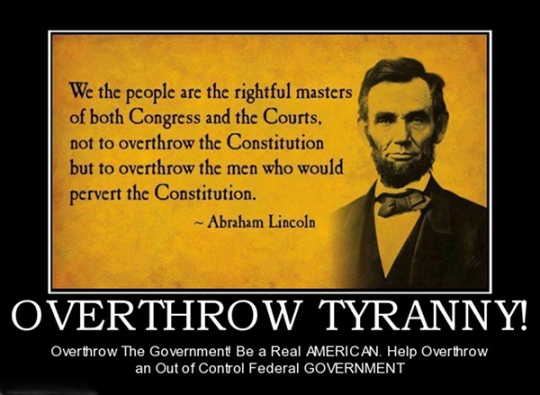
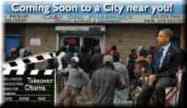 Mayors and city councils—in office largely courtesy of public apathy—are President Barack Obama’s boots on the ground in the ongoing, carefully orchestrated racial riots coming soon to a city near you. In their bid to rescue America from total Marxist eclipse, patriots, as it turns out, have been knocking on the wrong door.
Mayors and city councils—in office largely courtesy of public apathy—are President Barack Obama’s boots on the ground in the ongoing, carefully orchestrated racial riots coming soon to a city near you. In their bid to rescue America from total Marxist eclipse, patriots, as it turns out, have been knocking on the wrong door. While diverting public attention by snubbing senators, and overriding both Constitution and Congress, Obama is now hammering the final nail in the Fundamental Transformation of America coffin.
While diverting public attention by snubbing senators, and overriding both Constitution and Congress, Obama is now hammering the final nail in the Fundamental Transformation of America coffin. ‘We the People’ should have seen Baltimore and Ferguson coming on July 2, 2008, when Obama boasted in Colorado Springs, CO: “We cannot continue to rely only on our military in order to achieve the national security objectives that we’ve set. We’ve got to have a civilian national security force that’s just as powerful, just as strong, just as well-funded.”
‘We the People’ should have seen Baltimore and Ferguson coming on July 2, 2008, when Obama boasted in Colorado Springs, CO: “We cannot continue to rely only on our military in order to achieve the national security objectives that we’ve set. We’ve got to have a civilian national security force that’s just as powerful, just as strong, just as well-funded.”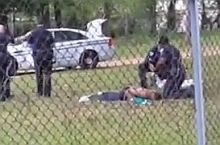 First came the smear job spreading the fallacy that police deliberately profile only young blacks, and are addicted to the habit of randomly shooting them. Marxist propaganda leaves the disingenuous impression that racist rogue cops dominate most police forces.
First came the smear job spreading the fallacy that police deliberately profile only young blacks, and are addicted to the habit of randomly shooting them. Marxist propaganda leaves the disingenuous impression that racist rogue cops dominate most police forces. One hundred police officers were injured in the Baltimore riots. Businesses up and running only the day before were left in burnt-out rubble, facts carelessly written off by Obama.
One hundred police officers were injured in the Baltimore riots. Businesses up and running only the day before were left in burnt-out rubble, facts carelessly written off by Obama.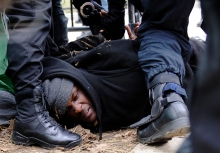 Obama counts on the same kind of apathy that dogs municipal elections about racial riots that are being staged, right down to including outside protesters being rushed in to the scene of the riots.
Obama counts on the same kind of apathy that dogs municipal elections about racial riots that are being staged, right down to including outside protesters being rushed in to the scene of the riots. By throwing gasoline on the racial discord gathering steam in American cities, is Obama sending a message to America’s foreign enemies that the U.S. is now at its most vulnerable for a strike?
By throwing gasoline on the racial discord gathering steam in American cities, is Obama sending a message to America’s foreign enemies that the U.S. is now at its most vulnerable for a strike?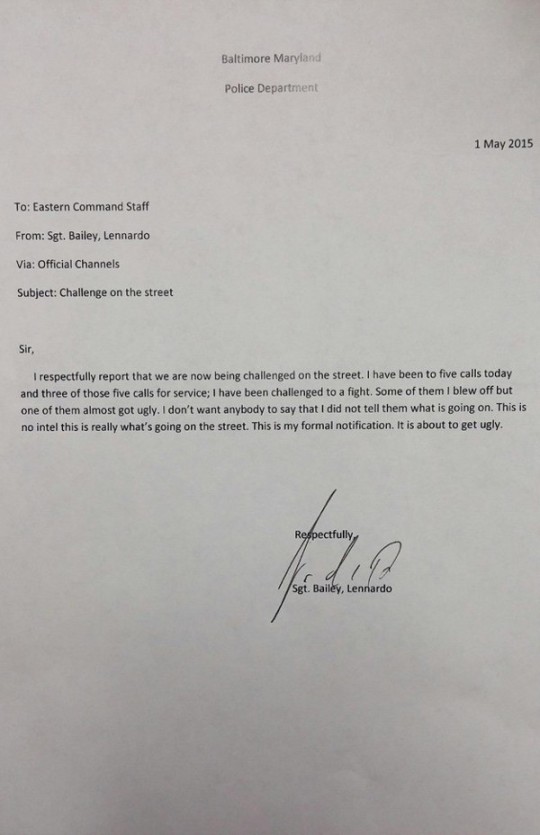
 On Wednesday, the Washington Post obtained a Baltimore Police Department document, which states that a prisoner in the vehicle transporting Freddie Gray heard Gray “banging against the walls” and “intentionally trying to injure himself.” The Post was given permission to publish the information, provided that the name of the witness remained anonymous, yet the newly-released details counter previous reports about the events leading up to Gray’s death. What is consistent, however, is police departments’ selective release of information that paints people injured or killed by police in a bad light — and mainstream media’s decision to buy into it.
On Wednesday, the Washington Post obtained a Baltimore Police Department document, which states that a prisoner in the vehicle transporting Freddie Gray heard Gray “banging against the walls” and “intentionally trying to injure himself.” The Post was given permission to publish the information, provided that the name of the witness remained anonymous, yet the newly-released details counter previous reports about the events leading up to Gray’s death. What is consistent, however, is police departments’ selective release of information that paints people injured or killed by police in a bad light — and mainstream media’s decision to buy into it. But cops aren’t the only group to affect smear campaigns against victims of lethal police force, as evidenced by the Post’s decision to publish the BPD document. As noted by Al Jazeera, the New York Times published an article about Brown’s recreational activities, saying “he dabbled in drugs and alcohol” and detailed his “rebellious streak.” The Associated Press tweeted that Renisha McBride, who was shot and killed by a Detroit homeowner, was intoxicated. CBS and NBC reported that Scott had a bench warrant for missing child support payments. Northeast Ohio Media Group detailed Rice’s father’s history of domestic violence.
But cops aren’t the only group to affect smear campaigns against victims of lethal police force, as evidenced by the Post’s decision to publish the BPD document. As noted by Al Jazeera, the New York Times published an article about Brown’s recreational activities, saying “he dabbled in drugs and alcohol” and detailed his “rebellious streak.” The Associated Press tweeted that Renisha McBride, who was shot and killed by a Detroit homeowner, was intoxicated. CBS and NBC reported that Scott had a bench warrant for missing child support payments. Northeast Ohio Media Group detailed Rice’s father’s history of domestic violence.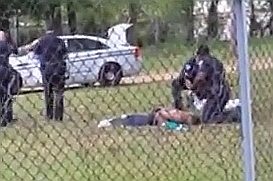 Walter Scott’s death was striking because a police officer fired eight shots at him while his back was turned. When something so tragic occurs, observers tend to wonder why. The officer’s actions and utter disrespect for human life can never be justified. But recently, the New York Times published new information about Scott’s split second decision to run — his child support case. According to his brother, “Every job he has had, he has gotten fired from because he went to jail because he was locked up for child support.”
Walter Scott’s death was striking because a police officer fired eight shots at him while his back was turned. When something so tragic occurs, observers tend to wonder why. The officer’s actions and utter disrespect for human life can never be justified. But recently, the New York Times published new information about Scott’s split second decision to run — his child support case. According to his brother, “Every job he has had, he has gotten fired from because he went to jail because he was locked up for child support.”
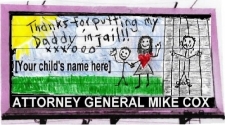 When entities spend significant time on activities that fail to help and that actually hurt parents and families, it’s often useful to redirect their energies elsewhere. Reforms should shift the program mission and values away from damaging racial stereotypes that hurt families of all races and towards efforts to accurately diagnose the needs of families and take ‘pro-social’ action to address them.
When entities spend significant time on activities that fail to help and that actually hurt parents and families, it’s often useful to redirect their energies elsewhere. Reforms should shift the program mission and values away from damaging racial stereotypes that hurt families of all races and towards efforts to accurately diagnose the needs of families and take ‘pro-social’ action to address them. With such a vision, services would start to look much different. No longer treated as enemies of the state, low-income fathers would be less likely to literally and figuratively run away from child support. The sole focus wouldn’t be on a father’s monetary value but on improving father-family relationships. Court decisions and unaddressed legal needs would be replaced by model practices like mediation that support mothers and fathers in making their own decisions for their families. Punishments like imprisonment would be replaced by employment assistance. And other proposed reforms designed to guarantee child support for women and children would avoid potential incentives to hound men for unaffordable reimbursements of funds states pay out to women and children.
With such a vision, services would start to look much different. No longer treated as enemies of the state, low-income fathers would be less likely to literally and figuratively run away from child support. The sole focus wouldn’t be on a father’s monetary value but on improving father-family relationships. Court decisions and unaddressed legal needs would be replaced by model practices like mediation that support mothers and fathers in making their own decisions for their families. Punishments like imprisonment would be replaced by employment assistance. And other proposed reforms designed to guarantee child support for women and children would avoid potential incentives to hound men for unaffordable reimbursements of funds states pay out to women and children. Walter Scott, a father to four children, was shot dead by a police officer later charged with first-degree murder while running away from him. One of the many questions some asked after the news of the shooting broke in the national press was why he might flee such an encounter. His family said it was because he owed so much in unpaid child support. “I believe he didn’t want to go to jail again. He just ran away,” Walter Scott Sr. told the press.
Walter Scott, a father to four children, was shot dead by a police officer later charged with first-degree murder while running away from him. One of the many questions some asked after the news of the shooting broke in the national press was why he might flee such an encounter. His family said it was because he owed so much in unpaid child support. “I believe he didn’t want to go to jail again. He just ran away,” Walter Scott Sr. told the press. But this strategy doesn’t necessarily help the parents who need child support, usually single mothers, and does little to help the fathers get jobs that pay enough to allow them to send money to their kids. A jailed father can’t earn any income, but his child support debts often keep accruing. Many states don’t allow people to reduce or suspend their child support obligations while they’re in jail, so they end up leaving with $15,000 to $30,000 in debt. They also face a more difficult time finding employment when they get out.
But this strategy doesn’t necessarily help the parents who need child support, usually single mothers, and does little to help the fathers get jobs that pay enough to allow them to send money to their kids. A jailed father can’t earn any income, but his child support debts often keep accruing. Many states don’t allow people to reduce or suspend their child support obligations while they’re in jail, so they end up leaving with $15,000 to $30,000 in debt. They also face a more difficult time finding employment when they get out. The best model is likely to be found in Europe. As of 2010, all European countries except the Netherlands guaranteed child support payments to custodial parents even if the noncustodial parent couldn’t pay or could only pay part. Sweden goes even further and has a guaranteed assistance program in which all custodial parents get a child support payment from the government no matter what, and the government then collects what it can from the noncustodial ones. Such a system seems to work — 95 percent of these parents get child support payments. This system “gets you a guaranteed minimum benefit whatever the nonresident father can pay,” explained Irwin Garfinkel, a professor of social work at Columbia University.
The best model is likely to be found in Europe. As of 2010, all European countries except the Netherlands guaranteed child support payments to custodial parents even if the noncustodial parent couldn’t pay or could only pay part. Sweden goes even further and has a guaranteed assistance program in which all custodial parents get a child support payment from the government no matter what, and the government then collects what it can from the noncustodial ones. Such a system seems to work — 95 percent of these parents get child support payments. This system “gets you a guaranteed minimum benefit whatever the nonresident father can pay,” explained Irwin Garfinkel, a professor of social work at Columbia University. Any such reform, however, would also have to be paired with changes to how we calculate what noncustodial parents owe. American fathers have the highest obligations among 14 of the richest countries, even if they are poor or unemployed (in eight countries, an unemployed father doesn’t owe anything). The U.S. is one of four that doesn’t exempt some portion of the noncustodial parent’s income for basic living expenses. Only five countries are so extreme as to jail fathers who don’t pay.
Any such reform, however, would also have to be paired with changes to how we calculate what noncustodial parents owe. American fathers have the highest obligations among 14 of the richest countries, even if they are poor or unemployed (in eight countries, an unemployed father doesn’t owe anything). The U.S. is one of four that doesn’t exempt some portion of the noncustodial parent’s income for basic living expenses. Only five countries are so extreme as to jail fathers who don’t pay. A guaranteed payment program, particularly one that doesn’t always try to recoup the costs from low-income fathers who can’t pay, would not come for free. But Garfinkel thinks the amount would be negligible compared to the benefits reaped. Even if custodial parents were guaranteed a payment as high as $3,000 a year, he estimated it would cost the government about $10 billion. Compared to the overall federal budget, “it’s not a big number and it would make a massive difference,” he argued. Poor mothers would not just have more income to invest in their children, but the stability of steady payments could be even more beneficial for children’s development.
A guaranteed payment program, particularly one that doesn’t always try to recoup the costs from low-income fathers who can’t pay, would not come for free. But Garfinkel thinks the amount would be negligible compared to the benefits reaped. Even if custodial parents were guaranteed a payment as high as $3,000 a year, he estimated it would cost the government about $10 billion. Compared to the overall federal budget, “it’s not a big number and it would make a massive difference,” he argued. Poor mothers would not just have more income to invest in their children, but the stability of steady payments could be even more beneficial for children’s development. Today, however, TANF payments are nearly all worth less than they were in 1996 and only reach a quarter of eligible families. Meanwhile, the system usually serves to discourage poor fathers from paying their obligations, given that they know their money isn’t going to actually make it to their children and the families aren’t usually getting an adequate amount of help from the state. As Elizabeth Lower-Basch, policy coordinator at CLASP, a policy organization for low-income people, put it, “Why on earth would you pay money to go to the state?”
Today, however, TANF payments are nearly all worth less than they were in 1996 and only reach a quarter of eligible families. Meanwhile, the system usually serves to discourage poor fathers from paying their obligations, given that they know their money isn’t going to actually make it to their children and the families aren’t usually getting an adequate amount of help from the state. As Elizabeth Lower-Basch, policy coordinator at CLASP, a policy organization for low-income people, put it, “Why on earth would you pay money to go to the state?” There are also some efforts across the country to change the way that noncustodial parents’ support obligations are calculated. Currently, when courts hear from a father that he doesn’t have a job or enough money to pay support, some states still calculate the child support payment on his supposed earning capacity or deem that he voluntarily lowered his earnings by taking a lower paying job or even getting fired. And, of course, there is the fact that if a father ends up going to jail over unpaid support, he can still keep accruing debt while he’s there. The Office of Child Support Enforcement proposed changes at the end of last year that would base child support orders on actual earnings and income, not imputed income, and allow incarcerated people to modify their orders rather than treating it as voluntary unemployment.
There are also some efforts across the country to change the way that noncustodial parents’ support obligations are calculated. Currently, when courts hear from a father that he doesn’t have a job or enough money to pay support, some states still calculate the child support payment on his supposed earning capacity or deem that he voluntarily lowered his earnings by taking a lower paying job or even getting fired. And, of course, there is the fact that if a father ends up going to jail over unpaid support, he can still keep accruing debt while he’s there. The Office of Child Support Enforcement proposed changes at the end of last year that would base child support orders on actual earnings and income, not imputed income, and allow incarcerated people to modify their orders rather than treating it as voluntary unemployment.
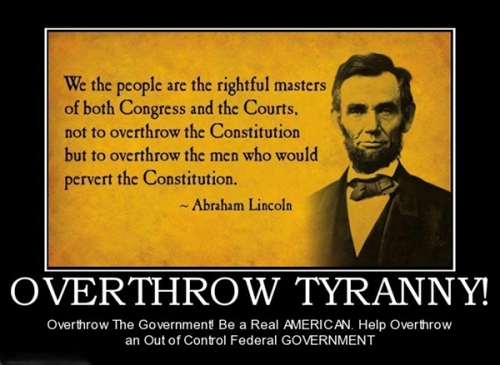
 Scott’s death on Saturday fueled national outrage as an example of continued unjustified killings, another black man vanquished at the hands of police. The killing also highlights the injustice in the child-support enforcement system, which often punishes non-custodial parents who can’t keep up with child support with jail time. This blight of law disproportionately affects African-American men, a debtor’s prison that puts people in jail for something they can’t pay, even when half of a paycheck is being garnished.
Scott’s death on Saturday fueled national outrage as an example of continued unjustified killings, another black man vanquished at the hands of police. The killing also highlights the injustice in the child-support enforcement system, which often punishes non-custodial parents who can’t keep up with child support with jail time. This blight of law disproportionately affects African-American men, a debtor’s prison that puts people in jail for something they can’t pay, even when half of a paycheck is being garnished.